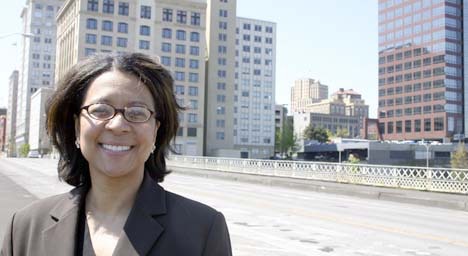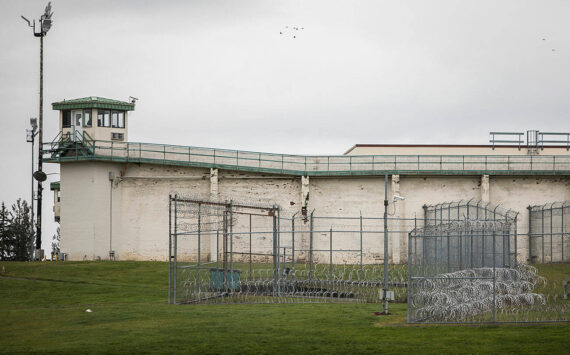Tacoma’s Interim City Manager Rey Arellano told Tacoma City Councilmembers Tuesday that the city’s General Fund budget — which pays for basic services such as police, fire, libraries, and residential street repairs — faces a $26 million shortfall through 2012. Arellano cited falling revenues, rising costs, a stagnant economy, and unexpected but necessary expenses as the reasons for the budget gap. “The City cannot work to close this gap without impacting all General Fund service areas, and the solution to the budget challenge will likely require staff reductions,” said a city official in a press release issued Tuesday afternoon. Budget workshops are scheduled through next month. A final budget is expected to be approved in December. On Tuesday, Arellano and several councilmembers commented on the budget during council’s noon study session. Here are some excerpts from that discussion. To view the complete budget presentation, visit http://www.cityoftacoma.org .
Tacoma Mayor Marilyn Strickland
I will put something out there which is unheard of in the public sector. If this were my private sector company [and I] saw the $26 million gap, I would walk in and say to my department heads, ‘We’re taking a 28% percent pay cut.’ With the bargaining agreements and other scenarios we have, we know that is not something you walk in and do. But . . . we have to look at everything and what form does that take. I guess I want to give my comment some context because I know it will be covered without any. We have a conversation about what we’re choosing and when we talk about staff reductions, we’re talking about reducing the service to the public. Our paramount duty is to serve the public . . . I feel if we’re going to have an honest conversation and look at the choices we make, we have to put everything on the table . . . If we’re going to do something that is progressive and forward-thinking for a government, Tacoma can serve as an example and I want to make sure we’re looking at every possible scenario. And I think I would like to end by saying every single person who works for the city, we work really hard and we take pride in doing good work and are here to serve the public. And these are just extraordinary times and we often talk as a nation about shared sacrifice that used to happen way back when, and this is a time for us to step up and say, ‘Are we really public servants and what are we willing to do to make this a better city?’
Tacoma City Councilmember Jake Fey
I think this is an opportunity for our labor partners to step up and help us. They know their considerations within their own organization and how that plays and what they can or can’t do. And the opportunity would be for them to propose how they can help us in this situation. So that is the takeoff from what you are saying — this would be better if it came from the employees themselves. I think we have to be careful about any new initiatives because there has to be a message out there and the message ought to be that the city council understands the situation we’re in and the same rules that applied previously have to be adjusted [when there is a] real emergency. We may have to step up with social service agencies and provide additional money rather than cutting them because of what is happening at the state level.
Deputy Mayor Lauren Walker
We have been very lucky in the City of Tacoma as we have seen the state make their cuts and seen other cities and counties make cuts. Many people have asked us what’s our secret, how have we been able to avoid the kind of cuts that they have been incurring. This is hard news, I think, for all of us and I think it is much more difficult when we look at the state projections, especially when we look at things like DSHS (Department of Social and Health Services) and how much they have cut already and are being expected to cut more. And the kinds of programs that they are cutting or anticipating cutting this next year. So when I look at my little non-profit budget, which is small compared to this, when I am looking at cuts of certain programs, it helped me with my decision making when we look at how much we are hurting people. When we look at just the kinds of — we’re talking jobs here and not only city jobs but the greater impact on the community and what those city jobs translate to is services. As I look around the room, there are many people here from arts organizations. I think about human rights and human services programs and a lot of the funds that we have, even general funds, to go social service organizations. They have been hit so hard by federal cutbacks. They have been hit hard by state cutbacks. And we have reduced our administrative services, like we don’t do domestic violence [programs] anymore because we passed that back to the community.
Tacoma City Councilmember Ryan Mello
Not to put words in madam deputy mayor’s mouth, but part of what resonated within me with her comment, speaking for myself, I think we should have a conversation about . . . the critical services that people depend upon. We can’t make decisions just based on a lot of what are just assumptions and that is what a lot of budget projections are — assumptions. We have really critical services that people depend on and are screaming for every single day, and I think we need to have a conversation about — we owe it to the citizens to have a three-part discussion, not just a traditional two-part discussion, about where we’re making assumptions about cutting and going lower. At a minimum, to have the discussion, if not to take action, about what would revenue enhancement look like so we can protect very critical services that people depend on for life safety and their quality of life and true existence and prosperity in Tacoma.
Interim City Manager Rey Arellano
We were very fortunate as a city and organization to be able to continue to deliver services and avoid layoffs through the past biennium when the recession was at its deepest. However, that is not the condition today. So there will be significant impacts. It is my duty as your city manager to come forward with a solution to balancing the budget by the end of the biennium and, as well, being able to position the organization to go forward with 2013-2014. One of the challenges of meeting that responsibility is going to be structuring it in a way that respects the dignity of our employees and those commitments that we have with the labor unions. What we will try to do is cast what we believe the reductions will be in terms of your strategic directions, around safe, clean, and attractive communities, sustainable economies and open and honest government.





